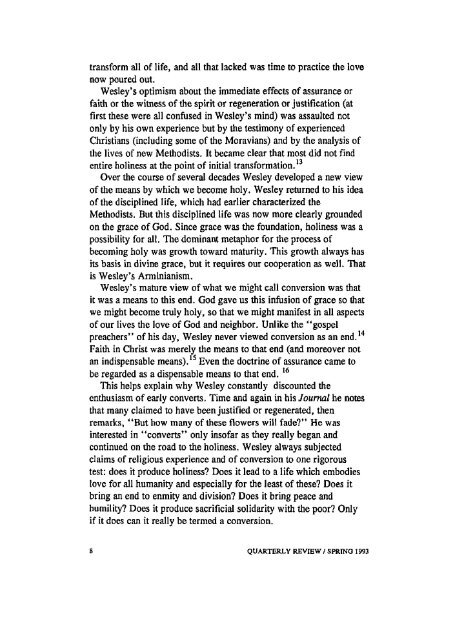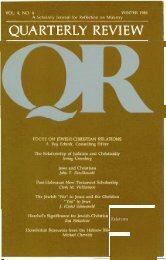TJieodore W. Jennings, Jr. The Meaning of ... - Quarterly Review
TJieodore W. Jennings, Jr. The Meaning of ... - Quarterly Review
TJieodore W. Jennings, Jr. The Meaning of ... - Quarterly Review
Create successful ePaper yourself
Turn your PDF publications into a flip-book with our unique Google optimized e-Paper software.
transform all <strong>of</strong> life, and all that lacked was time to practice the love<br />
now poured out.<br />
Wesley's optimism about the immediate effects <strong>of</strong> assurance or<br />
faith or the witness <strong>of</strong> the spirit or regeneration or justification (at<br />
first these were all confused in Wesley's mind) was assaulted not<br />
only by his own experience but by the testimony <strong>of</strong> experienced<br />
Christians (including some <strong>of</strong> the Moravians) and by the analysis <strong>of</strong><br />
the lives <strong>of</strong> new Methodists. It became clear that most did not find<br />
entire holiness at the point <strong>of</strong> initial transformation, 13<br />
Over the course <strong>of</strong> several decades Wesley developed a new view<br />
<strong>of</strong> the means by which we become holy. Wesley returned to his idea<br />
<strong>of</strong> the disciplined life, which had earlier characterized the<br />
Methodists. But this disciplined life was now more clearly grounded<br />
on the grace <strong>of</strong> God. Since grace was the foundation, holiness was a<br />
possibility for all. <strong>The</strong> dominant metaphor for the process <strong>of</strong><br />
becoming holy was growth toward maturity. This growth always has<br />
its basis in divine grace, but it requires our cooperation as well. That<br />
is Wesley's Arminianism.<br />
Wesley's mature view <strong>of</strong> what we might call conversion was that<br />
it was a means to this end. God gave us this infusion <strong>of</strong> grace so that<br />
we might become truly holy, so that we might manifest in all aspects<br />
<strong>of</strong> our lives the love <strong>of</strong> God and neighbor. Unlike the "gospel<br />
preachers" <strong>of</strong> his day, Wesley never viewed conversion as an end. 14<br />
Faith in Christ was merely the means to that end (and moreover not<br />
an indispensable means). 15<br />
Even the doctrine <strong>of</strong> assurance came to<br />
be regarded as a dispensable means to that end. 16<br />
This helps explain why Wesley constantly discounted the<br />
enthusiasm <strong>of</strong> early converts. Time and again in his Journal he notes<br />
that many claimed to have been justified or regenerated, then<br />
remarks, "But how many <strong>of</strong> these flowers will fade?" He was<br />
interested in "converts" only ins<strong>of</strong>ar as they really began and<br />
continued on the road to the holiness. Wesley always subjected<br />
claims <strong>of</strong> religious experience and <strong>of</strong> conversion to one rigorous<br />
test: does it produce holiness? Does it lead to a life which embodies<br />
love for all humanity and especially for the least <strong>of</strong> these? Does it<br />
bring an end to enmity and division? Does it bring peace and<br />
humility? Does it produce sacrificial solidarity with the poor? Only<br />
if it does can it really be termed a conversion.<br />
8 QUARTERLY REVIEW / SPRING 1993












